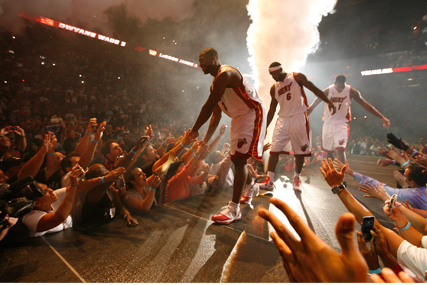
Since the appointment of David Stern as NBA (National Basketball Association) Commis-sioner more than 25 years ago, the sporting body has gradually developed into one of the slickest marketing operations in world sport.
Last week, the NBA announced that Toronto Raptors would play two games against the New Jersey Nets in London - the first time the league has played regular season fixtures in Europe.
The contest at The O2 may not set US fans' hearts racing, but Steve Martin, chief executive of M&C Saatchi Sport and Entertainment, predicts great success for the UK event, based purely on the strength of the NBA brand. 'That's the beauty of the NBA. You wouldn't see that (interest in a match between two average English teams playing in the US) even with the Barclays Premier League,' he says.
Interest from brands in 'NBA London 2011' is already high, and with good reason. Max Hamilton, senior director of business development for NBA in Europe, says the league will be offering brands 'innovative platform firsts'. He adds that the back-to-back London games will be broadcast nationally as well as locally in the US, although negotiations for the broadcast rights are still ongoing.
Such deals will offer opportunities to brands targeting the US market, as has been the case with the Wembley-based NFL (National Football League) games. 'In the NFL there are no shirt sponsors or advertising hoardings. (The UK game) is the only one where there is a chance to advertise pitchside. Given the popularity of (American football) in the US, it means brands get value for money,' says Alastair Kirk-wood, managing director of NFL UK.
Brand association
Another facet for UK brands to try to tap into is the NBA's success as a lifestyle brand, thanks in part to its association with urban culture. Nike's Air Jordan brand, launched in the mid-80s for player Michael Jordan, continues to earn the company millions of dollars each year. Today, Nike's most popular basketball range is fronted by LeBron James, and despite the player commanding a $90m (£58m) fee, the tie-up still represents value for money for the brand. 'King' James' announcement this summer that he was to join the Miami Heat was turned into a one-hour spectacle on national TV, while his presentation ceremony to Miami fans the following week was on an unparalleled scale - both gained Nike a great deal of publicity.
An NBA franchise based perman-ently in London would be ideal to grow the fan-base and give UK brands a more sustained timeframe to reach their audience. However, the logistics make this an unrealistic outcome. NBA teams currently play 82 regular season games a year prior to the NBA playoffs, which means racking up a lot of air miles. In contrast, NFL teams play 16 regular season games a year.
However, Martin points out that it is the nature of 'one-off' US sports visits to the UK that adds to the appeal and glamour. 'It's easy to generate an audience, but how sustainable is it if you were to have four, five or six games in a row?', he asks. 'Now it's all about the circus coming to town and the excitement that brings.'
The NBA is a marketing success both online and offline and uses its assets effectively. Any brand associat-ed with it reaps the benefits. It reaches out to its global audience through social media more effectively than any other sports league, and Hamilton stresses the opportunities this gives brand partners. Today, the NBA boasts the highest number of followers for a sport on Twitter and Facebook, with more than 5m combined.
The NBA also uses its foreign players to great effect to promote the brand back in their home countries. In particular, it has appealed to the Chinese market through Houston Rockets' 7ft 6ins star Yao Ming.
With the London Olympics just two years away, the NBA now has a great opportunity to promote its two British players, Luol Deng and Ben Gordon, to the UK market ahead of 2012, and in doing so continue to boost its own profile in the country.
215 - The number of countries to which the 2009-10 NBA season was broadcast (41 different languages).
99.4m - The global audience reached by the 2010 NBA finals, a 40% increase on 2009.
28.2m people in the US watched the last game of the 2010 NBA finals, the highest number for an individual match since Game 6 of the 1998 finals.
Source: NBA



_1.jpg)
.jpg)
